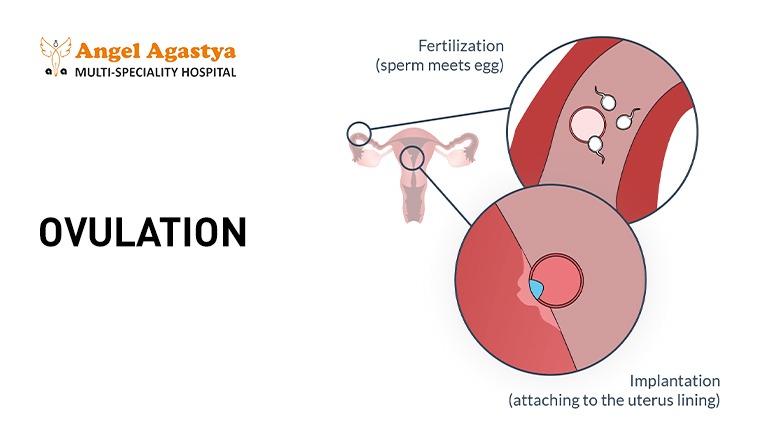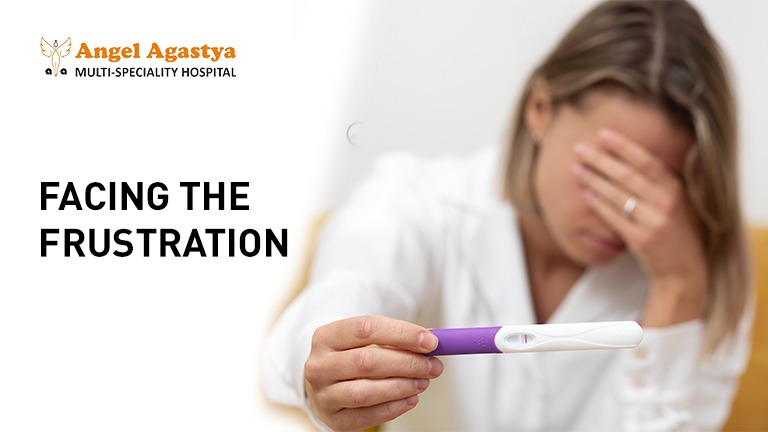Understanding Ovulation:
Ovulation, still not getting Pregnant. Before diving into the reasons behind the struggle to conceive, let’s establish a foundation:

- The Magic Window: Ovulation, the release of a mature egg from the ovary, is a crucial step in conception. Imagine it as a tiny window of opportunity – your most fertile days. Understanding your menstrual cycle and identifying this window is key to maximizing your chances of getting pregnant.
- Tracking Your Cycle: There are various methods for tracking ovulation, empowering you to pinpoint your fertile window. These include basal body temperature charting, ovulation predictor kits, and apps that analyze your cycle data. Experimenting with these tools can help you identify your most fertile days.
- Beyond Ovulation: While ovulation is essential, it’s like one piece of a complex puzzle. For conception to occur, a healthy sperm must meet a healthy egg at the right time. Let’s explore why this perfect timing or egg-sperm connection might not be happening, even with regular ovulation.
Facing the Frustration: Reasons Why Pregnancy Might Not Happen
It’s natural to feel frustrated when ovulation doesn’t lead to pregnancy. Here, we’ll discuss potential reasons that might be hindering conception:

- Female Fertility Factors:
- Irregular Ovulation: This can be caused by hormonal imbalances, polycystic ovary syndrome (PCOS), or underlying medical conditions.
- Blocked Fallopian Tubes: Blocked tubes prevent the sperm from reaching the egg for fertilization.
- Endometriosis: This condition can distort the reproductive organs and affect egg implantation.
- Hormonal Imbalances: Hormones like estrogen and progesterone play a vital role in ovulation and pregnancy. An imbalance can disrupt this process.
- Male Fertility Factors: Male fertility also plays a crucial role. Here are some common issues:
- Low Sperm Count: This refers to a lower than average number of sperm in the semen.
- Sperm Motility Problems: Sperm need to be able to move actively to reach the egg.
- Abnormal Sperm Morphology: The shape of the sperm can affect its ability to fertilize the egg.
- Unexplained Infertility: In some cases, despite extensive testing, no clear cause for infertility is found. This can be emotionally challenging, but there are still treatment options available.
Diagnosis and Treatment Options:
Feeling lost and unsure of the next steps? Don’t worry, help is available. This section empowers you with information about diagnosis and treatment:

- Consulting a Doctor: If you’ve been trying to conceive for a year (or six months if you’re 35 or older) without success, it’s time to consult a doctor. They can discuss your concerns, explore your medical history, and recommend next steps.
- Diagnostic Tests: Several tests can assess fertility for both women and men.
- For women, these might include blood tests to check hormone levels, ultrasounds to examine the uterus and ovaries, and HSG (hysterosalpingography) to check for blocked fallopian tubes.
- For men, semen analysis is the primary test to evaluate sperm count, motility, and morphology.
- Treatment Approaches: Depending on the identified cause of infertility, various treatment options are available.
- Ovulation Induction Medications: These medications can help regulate ovulation if you have irregular cycles.
- Intrauterine Insemination (IUI): This procedure involves placing washed sperm directly into the uterus, increasing the chances of fertilization.
- In Vitro Fertilization (IVF): This is a more complex procedure where fertilization occurs outside the body, and the resulting embryo is then transferred to the uterus.
Maintaining Hope and Taking Action:
Infertility can be emotionally challenging. This section provides resources and emphasizes the importance of self-care:

- Emotional Well-being: It’s normal to feel frustrated, sad, or angry. However, prioritizing your mental health is crucial. Consider joining a support group, talking to a therapist, or practicing relaxation techniques like yoga or meditation.
- Lifestyle Choices: Making healthy lifestyle choices can improve your overall health and potentially boost fertility. This includes maintaining a healthy weight, eating a balanced diet rich in fruits, vegetables, and whole grains, and limiting smoking and alcohol consumption.
- Building a Support System: Surround yourself with supportive loved ones who understand what you’re going through. Talking openly about your struggles can be incredibly helpful. Additionally, explore resources like fertility clinics, support groups, and online communities specifically for couples facing infertility.
Summary:
Month after month, you diligently track ovulation, your heart brimming with hope. Yet, disappointment seems to follow each cycle. You’re not alone. Many women experience the frustration of ovulation without conception. This blog aims to shed light on the reasons behind this, offering a roadmap to navigate this journey. We’ll explore factors affecting both female and male fertility, discuss diagnostic tests and treatment options, all explained in clear language. Take a deep breath, let’s explore this together. Remember, knowledge is power, and with the right information, you can move forward with a renewed sense of hope.
FAQs:
How long should I try to conceive naturally before seeking medical advice?
The general recommendation is to try for one year without success before consulting a doctor. If you’re 35 years old or older, it’s recommended to seek medical advice after six months of trying.
What are some reliable methods for tracking ovulation?
There are several reliable methods for tracking ovulation:
- Basal Body Temperature (BBT) Charting: This involves taking your temperature first thing every morning and charting the slight rise that occurs after ovulation.
- Ovulation Predictor Kits (OPKs): These kits detect a surge in luteinizing hormone (LH) that precedes ovulation.
- Fertility Apps: Many fertility apps track your cycle data, including BBT and cervical mucus changes, and predict your fertile window.
How can I improve my egg quality for conception?
While there’s no magic bullet, certain lifestyle changes can potentially improve egg quality:
- Maintain a healthy weight: Being overweight or underweight can affect egg health.
- Eat a balanced diet: Ensure your diet includes essential nutrients like folic acid, vitamin D, and omega-3 fatty acids.
- Reduce stress: Chronic stress can impact hormone levels and egg quality.
- Consider consulting a doctor: They might recommend supplements like folic acid or CoQ10 to support egg health.
What are some signs of ovulation that I can track at home?
There are several signs you can track that might indicate ovulation:
- Basal Body Temperature (BBT) Shift: Your BBT, your temperature when you first wake up, typically rises slightly after ovulation.
- Cervical Mucus Changes: The consistency of your cervical mucus can change around ovulation, becoming more slippery and egg-white-like.
- Ovulation Pain (Mittelschmerz): Some women experience a brief one-sided abdominal pain around ovulation.
Can stress affect my fertility?
Chronic stress can disrupt hormone regulation, potentially impacting ovulation and egg quality. Techniques like yoga, meditation, and spending time in nature can help manage stress and potentially improve fertility.
What are some myths about fertility that I should avoid?
There are many misconceptions surrounding fertility. Here are a few to debunk:
- Myth: You can’t get pregnant if you have irregular periods. (With treatment, ovulation can still occur.)
- Myth: Age doesn’t affect fertility. (Fertility naturally declines with age, especially in women over 35.)
- Myth: Lubricant harms sperm. (Many lubricants are sperm-friendly. Check the label.)
What are some financial resources available for couples facing infertility treatments?
The financial burden of infertility treatment can be significant. Here are some resources to explore:
- Health insurance: Some insurance plans may cover fertility treatments partially or fully.
- Fertility grants and loans: Several organizations offer financial assistance for infertility treatment.
- Crowdfunding platforms: Couples can create crowdfunding campaigns to raise funds for treatment.
How can my partner support me during this challenging time?
Open communication and emotional support are crucial. Your partner can:
- Listen to your concerns and frustrations without judgment.
- Help with household chores and childcare if you have children.
- Attend doctor appointments with you and be an active participant in the process.
- Research fertility treatments and options together.
What are some tips for maintaining a healthy relationship while struggling with infertility?
Infertility can put a strain on your relationship. Here are some tips to maintain a strong bond:
- Prioritize quality time together, focusing on activities you both enjoy.
- Practice open communication and express your feelings honestly.
- Seek professional counseling if needed to navigate the emotional challenges.
- Celebrate small victories and focus on your shared goals.
Remember: This blog is intended for informational purposes only. It’s crucial to consult with a qualified healthcare professional for personalized advice on your specific situation. They can perform a thorough evaluation, recommend appropriate tests, and discuss the most suitable treatment options for you and your partner.


Hello there! Do you know if they make any plugins to help with Search Engine
Optimization? I’m trying to get my website to rank for some targeted
keywords but I’m not seeing very good results. If you know of any please share.
Appreciate it!
You can try Rank Math or Yoast SEO plugin for that. As well as, do deep regular analysis and reporting of the keywords and your competitors.
Hi there! Do you know if they make any plugins to help with Search Engine Optimization? I’m trying to
get my site to rank for some targeted keywords but I’m not seeing very good success.
If you know of any please share. Cheers!
Sure. You can contact Himanshu Jain (our SEO person) https://www.linkedin.com/in/himanshu-jain-comhata/. He’ll help you det rank for sure.
I couldn’t resist commenting. Very well written!
I am really thankful for your kind words.
I seriously love your website.. Great colors & theme. Did you make this site yourself? Please reply back as I’m planning to create my very own blog and would love to know where you got this from or what the theme is called. Many thanks!
Thanks for your appreciation. You can contact our developer – Himanshu Jain (himanshuofficial939@gmail.com).
This is a topic that’s near to my heart… Many thanks! Exactly where can I find the contact details for questions?
On our website.
Hey there! I just want to offer you a huge thumbs up for your excellent info you have right here on this post. I will be returning to your website for more soon.
Sure. You’re always welcome.
Very good post. I am dealing with some of these issues as well..
Hope you get the solution from reading this.
Excellent blog you have here.. It’s difficult to find quality writing like yours these days. I honestly appreciate individuals like you! Take care!!
Thanks for your lovely words.
Pretty! This was an incredibly wonderful post. Many thanks for providing this info.
Thank you for your kind words.
This is a topic that is close to my heart… Best wishes! Exactly where are your contact details though?
Thank you for your kind appreciation.
I’m impressed, I must say. Truly rarely do you encounter a weblog that’s both educative and entertaining, and let me tell you, you may have hit the nail around the head. Your concept is outstanding; ab muscles a thing that there are not enough folks are speaking intelligently about. I’m happy which i came across this at my look for something with this.
Thank you for your lovely words.
I blog quite often and I seriously appreciate your content. This great article has truly peaked my interest. I will bookmark your website and keep checking for new details about once a week. I subscribed to your Feed as well.
Thank you for your kind appreciation.
Nice post. I learn something totally new and challenging on websites I stumbleupon on a daily basis. It’s always useful to read through content from other writers and practice a little something from their websites.
Thank you for appreciation.
Right here is the perfect web site for anybody who hopes to find out about this topic. You know a whole lot its almost tough to argue with you (not that I really would want to…HaHa). You definitely put a brand new spin on a subject that has been written about for a long time. Excellent stuff, just great.
Thank your for you kind words and appreciation.
This site was… how do you say it? Relevant!! Finally I have found something which helped me. Thanks a lot!
Thank your for your lovely words.
I couldn’t refrain from commenting. Exceptionally well written.
Thanks for your read.
An impressive share! I have just forwarded this onto a friend who has been doing a little homework on this. And he in fact ordered me lunch due to the fact that I found it for him… lol. So allow me to reword this…. Thanks for the meal!! But yeah, thanx for spending the time to discuss this subject here on your web site.
Thanks for your appreciation.
This is great content.
Thanks for your kind words.
Fantastic. Worth every minute. Helped as expected.
Thanks for your appreciation.
Terrific article. It’s extremely well-written and full of beneficial insight. Thanks for providing this content.
Thanks for your kind words.
Thanks, great advice!
Thanks for your kind words.
Howdy! This blog post could not be written much better! Looking through this post reminds me of my previous roommate! He always kept talking about this. I am going to send this information to him. Pretty sure he will have a great read. I appreciate you for sharing!
I appreciate your kind appreciation.
Wow, that’s useful!
Thanks for your appreciation.
Your posts are top notch.
Thanks for your appreciation.
This blog was… how do you say it? Relevant!! Finally I’ve found something that helped me. Thanks a lot!
Thanks for your kind words.
Straight to the point, i love it. Dont let anyone stop us bloggers.
Thanks for your appreciation.
You are so cool! I don’t suppose I have read anything like this before. So nice to find somebody with some original thoughts on this subject matter. Seriously.. many thanks for starting this up. This website is one thing that’s needed on the web, someone with some originality.
Thanks for your kind words. These words motivates us to keep going.
This is genius.
Thanks for your kind words.
Hi there! I simply would like to give you a big thumbs up for
the excellent info you’ve got right here on this post.
I’ll be returning to your website for more soon.
Thank you so much for your kind words. You’re always welcome.